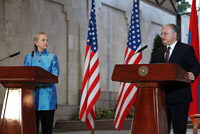As it was expected during the Clinton-Nalbandyan press conference the parties adverted to the Azerbaijani diversion recorded a day before Clinton’s visit. As a result of this diversion three Armenian military servants were killed and several were left injured. “While I had only just learned of these incidents, I am very concerned about the danger of escalation of tensions and the senseless deaths of young soldiers and innocent civilians. The use of force will not resolve the Nagorno-Karabakh conflict, and therefore force must not be used. And we are calling on everyone to renounce force as well as refraining from violence. I assured the president that I would make these points in Baku when I am there the day after tomorrow. Now, these incidents underscore the necessity to try to keep making progress on the peace process. As a co-chair of the Minsk Group, the United States is committed to working with all the parties to find a way forward. And I am very committed that there has to be a way forward. And it’s not only the actions of leaders; it must be the actions of citizens as well to try to find a way to enable people of the region to live together in peace and dignity. So there is a lot of work ahead of us, but I am very pleased to have this opportunity to have come to catch up with my friend and colleague, Eduard, as well as to see the president again to review very broadly regional and global matters as well as our bilateral relations. And I think it’s important that we keep working together, because I believe Armenia has a very positive and bright future ahead.” In his speech Nalbandyan also condemned the provocation of Azerbaijan, by mentioning that it is endangering the negotiation process and regional stability. And Azerbaijan should be held accountable for the consequences. As of the diplomatic solution of the conflict, then the NKR conflict, according to Clinton, the conflict should be resolved based on the key three Helsinki principles (abstaining from the use of force, territorial integrity, self-determination). Let’s mention that before Clinton’s visit to Armenia the New York Times issued a long publication about the goals of the visit. “Terrorism and insurgency are spreading in Russia’s North Caucasus region. Russian military occupation of Abkhazia, South Ossetia, and adjacent areas in Georgia heightens strains. Renewed hostilities are increasingly possible between Armenia and Azerbaijan over the ethnic Armenian enclave of Nagorno-Karabakh in Azerbaijan,” writes the paper and adds that the return of Vladimir Putin to the post of the President escalates the threat. “Vladimir Putin’s return to Russia’s presidency adds complexity. He seeks to increase Russia’s influence over former Soviet neighbors, counterbalancing the appeal of the NATO and the European Union. Last month, Putin skipped a G-8 summit but convened leaders from the Collective Security Treaty Organization, whose other members are Armenia, Belarus, Kazakhstan, Kyrgyzstan, Tajikistan and Uzbekistan. Russia is pushing for a widened Eurasian customs union, which Ukraine is resisting. A fragile cease-fire is frequently violated. Russia arms Armenia and maintains a military base there. Azerbaijan uses its oil wealth for an arms buildup, and its ally Turkey has closed the border with Armenia for more than a decade. The Nagorno-Karabakh conflict could suddenly become unfrozen. In this regard, Secretary of State Hillary Clinton’s visit to Armenia, Azerbaijan, and Georgia this week is timely.” “The Caucasus holds risks of confrontation that could affect American and European interests, and it requires regular and high-level attention. America and Europe can no longer keep the Nagorno-Karabakh talks on the back burner. Azerbaijani President Ilham Aliyev faces domestic pressures to act, but Europe and America should caution him about the adverse consequences, notably a broader regional war. Energy investment in Azerbaijan and a major new gas pipeline to Europe, Nabucco, could become casualties,” writes the paper and asks whether Clinton should draw attention to this tense situation and reiterate that the west will actively work to prevent conflicts and confrontations. In short, the main goal of Clinton’s visit is to ease the passions. It’s hard to say whether she’ll succeed or not. The fact is that currently the opposite is taking place and so far Azerbaijan conducts broad-scale diversions. During yesterday’s press conference, as it was expected, Clinton spoke about the Armenia-Turkey relations. Both Clinton and Nalbandyan reiterated that their approach hasn’t changed. “More than once we have expressed our common approach on the normalization of the Armenian-Turkish relations. That position has been and remains the normalization of relations without preconditions. You have made an exclusive contribution to this process. Thank you very much. Unfortunately, the ball continues to remain in the Turkish court. Twenty years ago, Armenia had just begun its transition to democracy. There have been positive steps, and now we need to take more. We know from experience that democracy must be built over time. It isn’t about just one campaign or even one election. It is an ongoing project. And we are pleased to see Armenia continuing to work to strengthen your democratic institutions to promote transparency, advance the rights of a free press, root out corruption, respect universal rights and freedoms,” said Clinton. In this regard Nalbandyan said, “There are no hidden negotiations with Turkey and there cannot be. The negotiations ended and as a result of that protocols were signed and Turkey hasn’t ratified those yet.”

